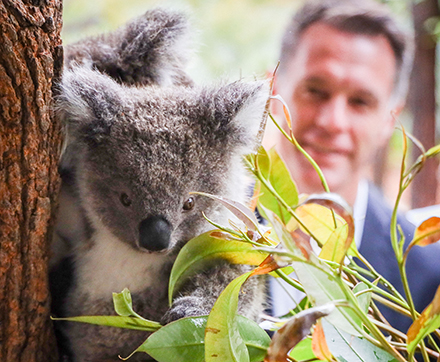In recent developments, the New South Wales Department of Planning and Environment decision not to include Forest and Wood Communities Australia (FWCA) in the Great Koala National Park has sparked controversy and raised concerns among stakeholders.
The exclusion of FWCA, a representative body for forest-dependent communities, has fuelled debates about the composition of the community advisory panel, particularly the presence of what some view as extremist environmental groups.
While some fringe groups believe The Great Koala National Park initiative aims to protect koala habitats and promote conservation – the NSW Government’s decision to exclude FWCA from the advisory panel has left forest-dependent communities feeling unheard and sidelined in discussions that directly impact their livelihoods and deeply suspicious of the pro-activist tendencies of the Minns Labor Government.
Below is the email rejecting FWCA Executive Officer Mick Harrington from taking part in the GKNP advisory panel process.
Dear Mr Harrington
I refer to your email to the Minister for Climate Change, Minister for Energy, Minister for the Environment and Minister for Heritage, the Hon Penny Sharpe MLC, and the Minister for Agriculture, Minister for Regional New South Wales, and Minister for Western New South Wales, the Hon Tara Moriarty MLC, regarding the Great Koala National Park Industry Advisory Panel. Your email was referred to the National Parks and Wildlife Service (NPWS) and I have been asked to reply.
As previously advised, the member list for the advisory panels has been jointly agreed by the NSW Minister for the Environment, the Hon Penny Sharpe MLC, and the Minister for Agriculture, Minister for Regional New South Wales, and Minister for Western New South Wales, the Hon Tara Moriarty MLC. NPWS is not currently accepting nominations for additional members unless directed by the relevant Ministers. In this case, your nomination has not been agreed by the Ministers.
One contentious aspect is the composition of the community advisory panel, which includes environmental groups such as Bellingen Environment Centre, Clarence Environment Centre, Nambucca Valley Conservation Association, North East Forest Alliance, and World Wildlife Fund (WWF).
While these groups purport to play a role in advocating for environmental conservation, many argue that their inclusion on the panel leans much to heavily towards an extremist perspective, potentially neglecting the interests of timber communities, families and law-abiding businesses.
Pro-National park groups, like the National Parks Association, have also found a place on the advisory panel. The aims of all the aforementioned groups towards locking up vast swathes of the public land estate into National Parks that reject the sustainable timber sector alongside many other law-abiding public land users has sparked concerns among those who believe that the panel should represent a balanced array of perspectives to ensure a fair and comprehensive decision-making process.
Forest and Wood Communities Australia represents the interests of communities that rely on the timber industry for their livelihoods. The exclusion of this organization from the advisory panel raises questions about the extent to which the diverse voices of those directly impacted by conservation measures are being considered in the decision-making process.
Critics argue that the advisory panel’s composition will likely lead to decisions that favour the lock and leave approach at the expense of sustainable forestry practices. Striking a balance between conservation efforts and the economic well-being of forest-dependent communities is essential for the success of initiatives like the Great Koala National Park.
Engaging in open and inclusive dialogue with all stakeholders, including FWCA, is crucial for developing effective conservation strategies that are both environmentally sustainable and socially responsible. Excluding a representative body like FWCA from the process raises concerns about the transparency and inclusivity of the decision-making surrounding the Great Koala National Park.
The NSW Government’s decision not to include Forest and Wood Communities Australia in the Great Koala National Park advisory panel has ignited debates about the representation and balance of perspectives in this very important debate. Striking a harmonious balance between environmental conservation and the interests of forest-dependent communities is essential for fostering sustainable solutions that benefit both ecosystems and livelihoods. Open dialogue and inclusive decision-making processes will be key to addressing the concerns raised and ensuring the success of initiatives like the Great Koala National Park.
Mick Harrington. Executive Officer of Forest and Wood Communities Australia






